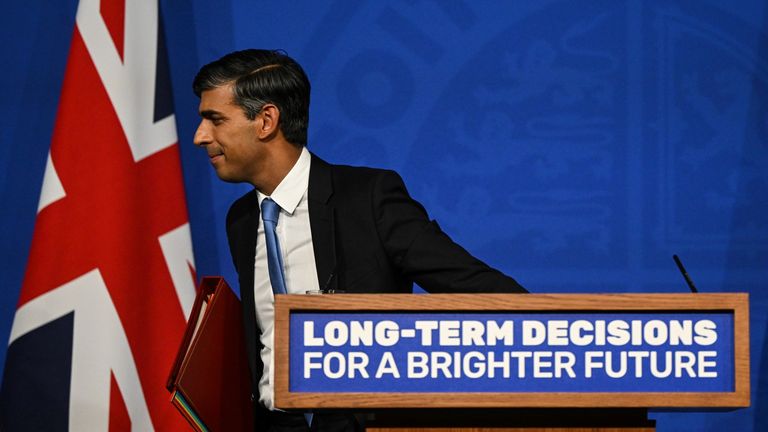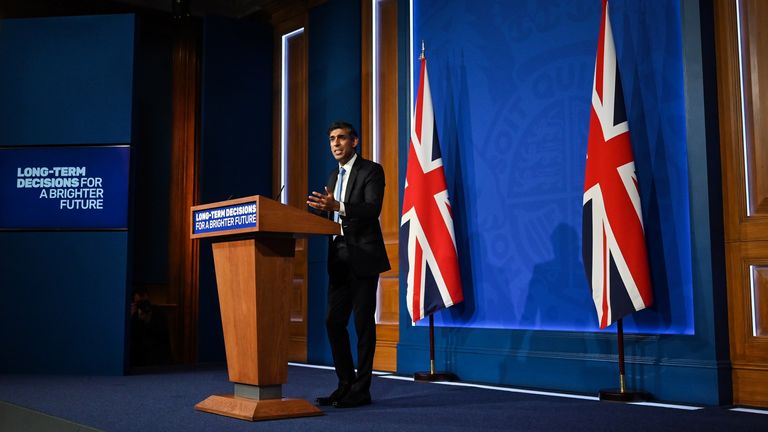UK is well off its climate pledges, which is why green groups are horrified by Sunak's huge gamble
Emissions targets put the world on course for a rise of 2.8C - and the UK was already falling behind.
Wednesday 20 September 2023 21:16, UK
The prime minister is kicking the green can down the road.
In the short term, a delay to expensive zero carbon measures may be popular with some voters and, he hopes, see the Tories into another term in office.
But the UK is already falling behind on the pace needed to reduce greenhouse gas emissions. And that's why green groups are horrified.
This isn't just about net zero in 2050. There are tough milestones along the way, and some are soon.
By 2030 the UK has an international obligation to reduce emissions by 68% from 1990 levels.
That's less than seven years away and Rishi Sunak says he remains committed to the target.
At the moment we are well off track.
According to the Committee on Climate Change (CCC), emissions have fallen by 46% since 1990.
Much of that is down to the power sector, which has been exiting expensive fossil fuels as fast as it can. Wind and solar are now so much cheaper than gas.
Strip out electricity generation, though and UK emissions are falling by just 1.2% a year.
That needs to quadruple to stay on track with the carbon targets, the CCC said.
So delaying the ban on new petrol and diesel cars, and relaxing the transition away from gas boilers, would seem to put the targets even further out of reach.
The prime minister is banking on technology and the market saving us.
Improving technology and efficiencies of scale are predicted to reduce the cost of an electric vehicle (EV) to the same as a petrol or diesel car sometime this decade.
If the range also increases as predicted, and the charging network is expanded in step with EV sales, then the barriers to driving electric start to crumble and emissions fall.
Ford, Fiat, Peugeot, Volvo and Vauxhall are among several car companies that have said they will stop selling vehicles with an internal combustion engine by 2030.
They're sticking to their business plan even if the political target slides.
Read more:
Will PM's changes affect me?
Live reaction to PM's green policy changes
What are the government's green policies?
Technology and the market could also help decarbonise home heating, despite the weaker net zero plan.
At the moment, heat pumps are expensive and work best in well-insulated homes with underfloor heating.
But new models can heat radiators to the same high temperatures as gas boilers. And if costs to purchase and run the pumps fall, then gas boilers start to look like dated technology.
Relying on the market to cut emissions is a huge gamble though.
It has reduced the cost of solar and wind technology by 85% since 2010, but there may be reasons - a shortage of lithium for car batteries, for example - that keep the price of EVs high.
Be the first to get Breaking News
Install the Sky News app for free


If the market doesn't deliver, then the government will have to play catch-up.
And technology alone won't get us to net zero. There will need to be some change to our lifestyles, such as eating less meat - which might be good for our health as well as the planet - but that will need political leadership.
The rapidly changing climate is a sure sign that emissions need to come down fast.
We've had another year of extreme weather, with lives lost and a big clean-up bill.
And that's with global temperatures up just 1.1C since the Industrial Revolution.
Currently, emissions targets put the world on course for a rise of 2.8C.
The more governments waver on net zero plans, the worse climate change and the higher the adaptation costs are likely to be.






